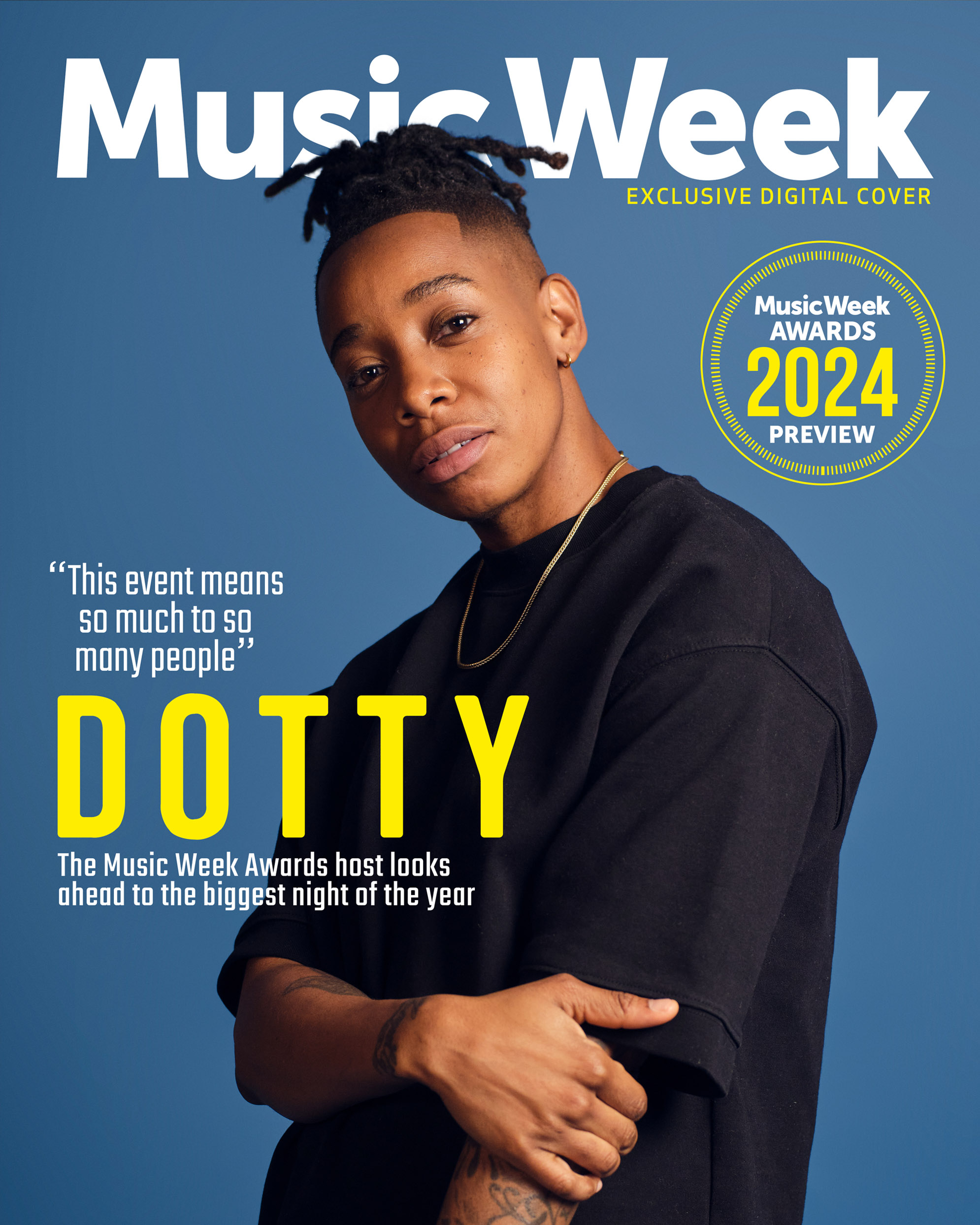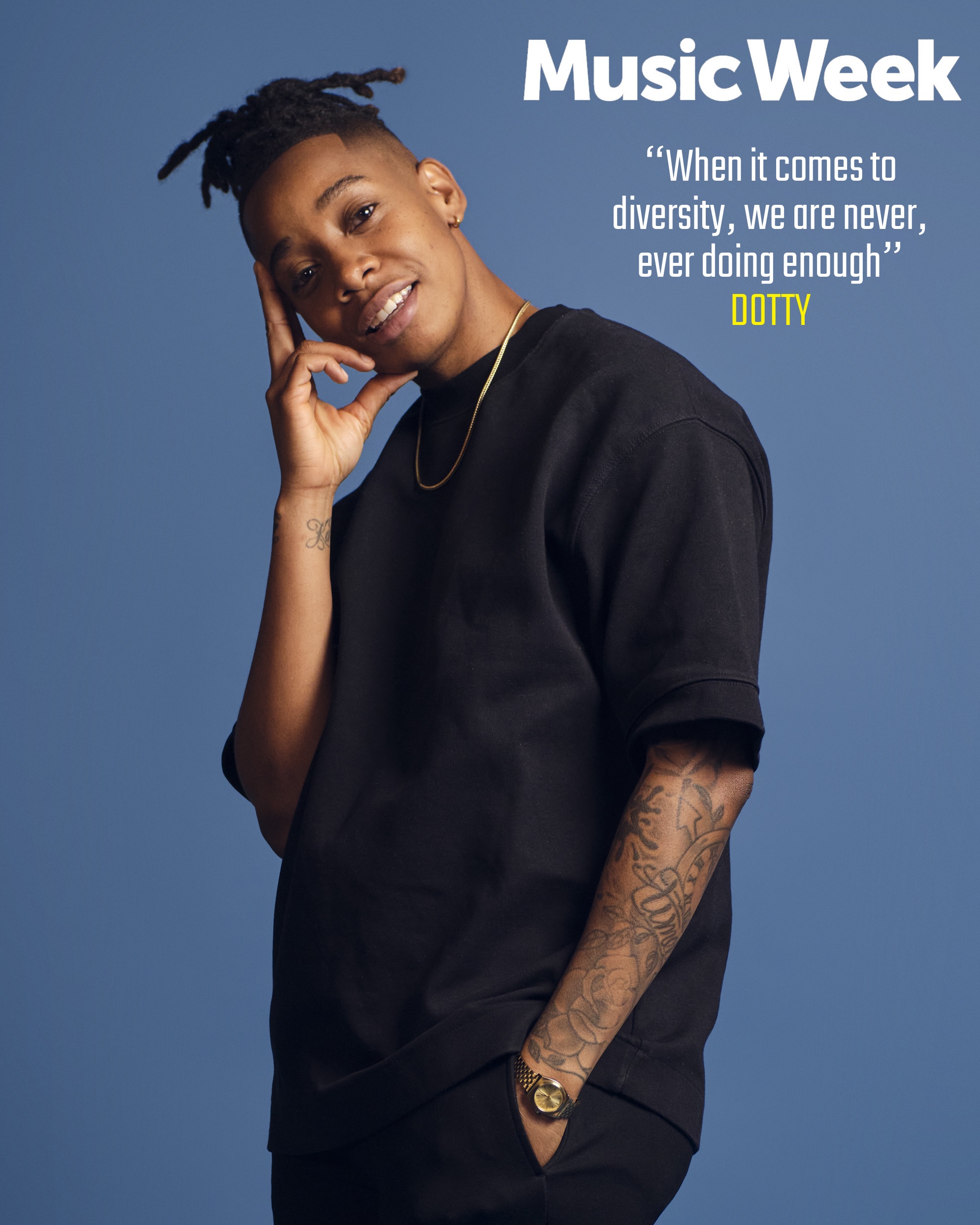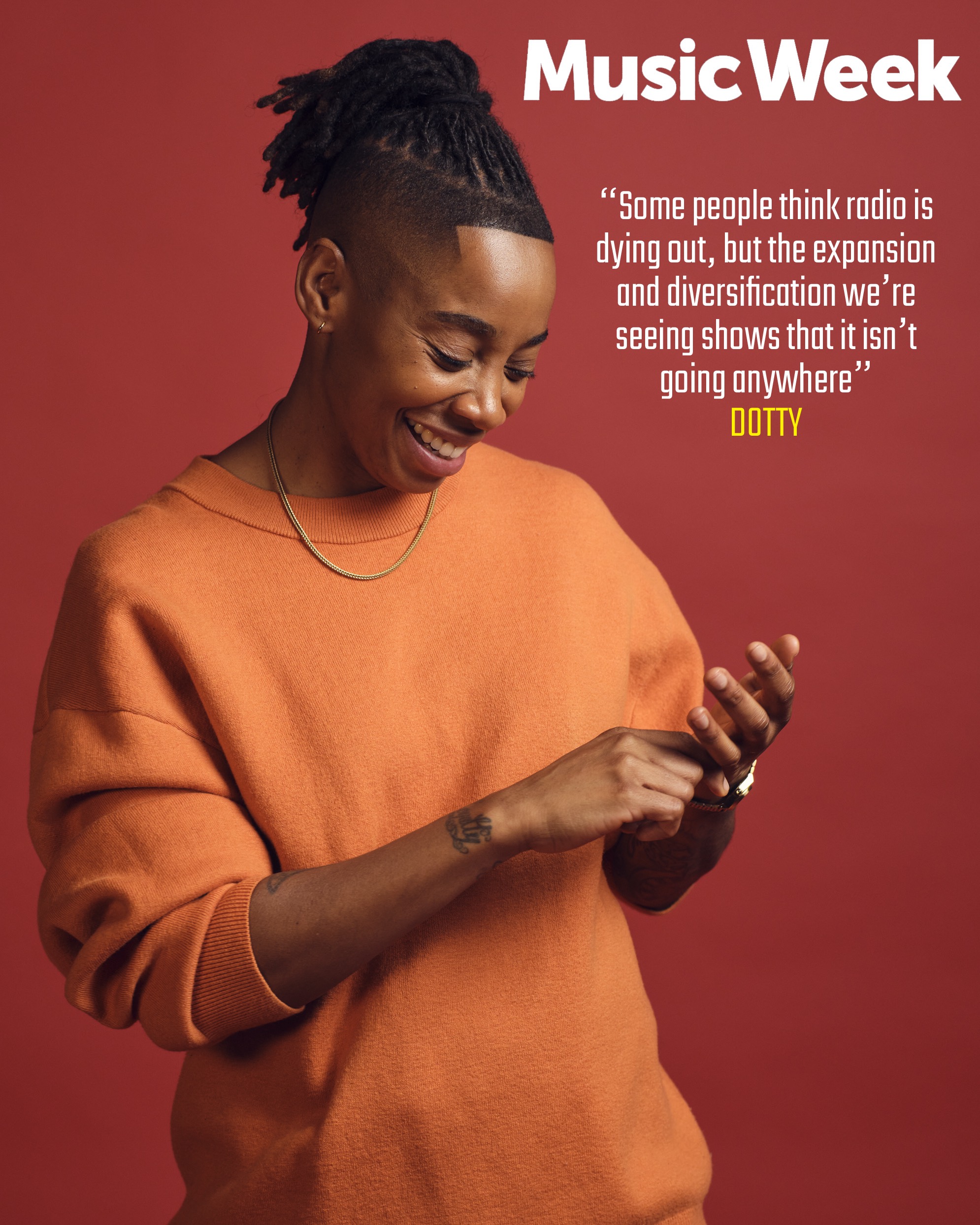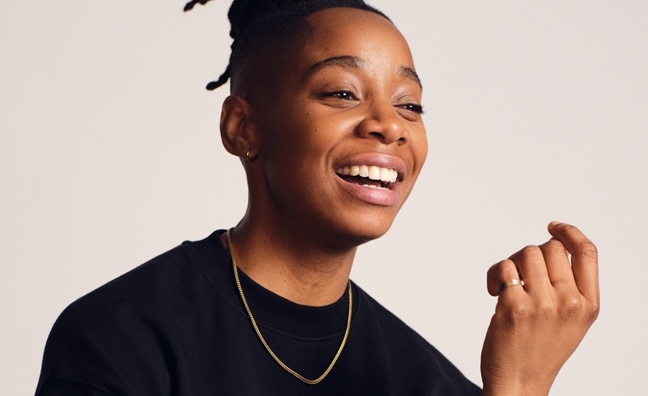As Apple Music’s lead cultural curator of Black Music, UK and the host of The Dotty Show, Dotty is at the forefront of championing Black music and breaking acts in the UK and beyond. On May 2, she will be taking to the stage to present the Music Week Awards 2024 and, to celebrate, we meet our host to hear all about her career journey so far, why the art of radio is timeless and what the industry must do to better support diverse voices…
“I’ve been to the Music Week Awards before and really felt the sense of occasion,” says Dotty, smiling as she sits down to talk to Music Week from her home in London. “But I’ve never won an award, so I’ve always been the bridesmaid instead of the bride, but now I’m going straight to being the priest!”
Dotty is one of the UK’s leading tastemakers and has been at the forefront of a litany of mainstream breakthrough stories since she became Apple Music's lead cultural curator of Black Music, UK and host of the The Dotty Show in 2020. She has led the way in spotlighting the likes of Grammy winner and recent Music Week cover star Tyla as well as Central Cee (“The first interview Central ever did was with me and now he’s at dizzying heights”).
“As soon as you’re celebrating something, you’re off to a good start,” she says. “And that’s what my show is, a celebration of Black Music and all the different pockets of Black music all over the world.”
Dotty started out as a rapper (“a very interesting and incredibly difficult time”), signing to Virgin Records in 2012 – at that time becoming the first female MC in the UK to secure a major-label deal in over a decade. Her broadcasting career sparked to life at BBC Radio 1Xtra after an on air exchange with Trevor Nelson, who she lovingly describes as a “broadcasting legend”.
“I was in BBC Radio 1Xtra’s Live Lounge as an artist and after my performance during the interview with Trevor, he just said to me, ‘I don’t feel like I’m interviewing you, I feel like we’re co-hosting the show!’” she reflects. “He said, ‘Do you want to come back next week and co-host with me?’ And I was just like, ‘Absolutely.’”
Dotty began co-hosting with Nelson, before making a pilot for her own show and, after a surprise slot at Radio 1’s Big Weekend, she began to climb through the ranks, until she was offered the Breakfast Show (“a crazy turn of events”), where she interviewed stars including Janet Jackson, Stormzy and Raye.
Dotty’s attitude throughout her career has been to never miss an opportunity when it presents itself.
“I think it’s so important to say yes and figure out how to get there later,” she affirms. “Just recognising how lucky I am, how I started at a checkout at Waitrose and now being on the front row of the music industry, it is such a privilege, and I have got to hold onto it with both hands.”
Indeed, in her current position, Dotty has continued to lead the way in championing Black music, featuring artists like Kojey Radical, Bellah, Ghetts and Wizkid on her show. In the last year alone, her interviews with Nines, Chloe Bailey, Tiwa Savage, NSG and more have made waves.
And her accolades do not end there. Dotty is also the author of Outraged: Why Everyone Is Shouting And No-one Is Talking, a 2020 book exploring the concept of anger, activism and the role of social media in modern society.
“I am always going to be in favour of anything that brings audiences closer to artists,” she says, when asked about her view on the role that platforms like TikTok and Instagram play in the music business today. “Social media does give fans direct access to their artists, but I don’t want it to ever come at the expense of artist development – where it is the only thing that decides what works.”
Right now, though, her attention is firmly focused on this year’s Music Week Awards, where she will stand before the UK industry at this year’s new location, The JW Marriott Grosvenor House.
“It’s going to be really great to steer a ship that I’ve been on a few times,” she smiles. “It’s just about striking a balance of having fun with it, but also maintaining that reverence that we should have for the event.”
And with that, we embark on a conversation in which Dotty opens up about her indsutry journey, speaks out about the industry's diversity issues and reveals why the art of radio is far from dying…

First of all, as we get closer to the big night, how are you feeling about getting up in front of the industry at the Music Week Awards?
“I’m really looking forward to hosting the awards, I will have fun with it, but also respect the gravity of the ceremony as well. The Music Week Awards mean so much to so many people, it’s one of those rare occasions where you can be really celebrated amongst your peers, so I think it’s really important to uphold that sense of occasion. And reining in the long speeches – I’m there to make sure we run to time!”
Your show is also on the shortlist this year - what is it about it that cuts through?
“I think what my whole team does well is recognise the responsibility we have to support the artist community, instead of just being like, ‘We’re going to play the music but not provide any extra support.’ It’s a responsibility that we take very seriously, and we’re always thinking, ‘What else can we do?’ Every show sounds different because there’s also an abundance of music to choose from, we’re not tethered to a playlist so we have this unbelievable freedom to be able to play the music that moves us on that day. We also have themed days, like ‘Worldwide Wednesday’, which is a great place for people to get a bit of music education. That’s not in a lofty high-brow way where we’re like, ‘We’re going to teach you all about music today’, but it’s a place where you’re going to come and hear something you’ve never heard before. We dive into French R&B, Australian drill, you’re able to connect to different nations. I love it.”
As someone who is up on all the breaking acts, who is exciting you most right now?
“Well, it seems cheeky to tip this artist now because she has already picked up a Grammy, but I’m really excited about Tyla. When you’re coming off the back of a viral moment like she had with Water, it can be really tough to drop an album, but her debut [record] is an incredible body of work and I think it’s testament to how long her career could be. About two years ago, our team in the Johannesburg office were like, ‘You have to check out this girl Tyla, she's going to be incredible and we’re expecting really big things for her.’ As soon as I heard her music, I remember thinking, ‘This is a pop star.’ It’s so exciting to have an artist who shows that there is so much more to music coming out of the African continent than just lumping it all under the [term] ‘Afrobeats’. There are pop stars and rock stars, and artists like Tyla can really demonstrate that, so I’m really excited to see how her year pans out. We’re only just scratching the surface.”
Do you think the industry is doing enough to support artists coming out of Africa?
“There is so much more that can be done to support the music coming out of the African continent. I’m looking forward to seeing how the infrastructure of the industry on the continent grows in the coming years, like arenas being built and landmarks being reached that show people there isn’t a trend that’s like, ‘Oh we’re listening to African music now, are we?’ We have to realise that there is no such thing as 'African music', there are nuances across genres. Incredible R&B is coming out of Kenya, the most exciting hip-hop I’m hearing is coming out of Nigeria, house and dance music in South Africa are phenomenal. So I think the first thing that needs to be done is education about music coming out of the continent, understanding that it is a rich tapestry. And then, it’s about reinvesting in it, because it’s a hub of incredible entertainment, not just a place that exports music. Some of the most exciting artists in the past couple of years have been coming out of the African continent.”

In terms of the acts you've featured on your show, what have been some of the key highlights of the last year?
“I’m in a position where I get to speak to people whose music I love, so they all feel like highlights. But it’s always a pleasure speaking to Nines – what I love about artists like him and Digga D is that sometimes you can bring something out in them that might not happen in another setting. Something that us anchors – myself, Zane [Lowe], Ebro [Darden] – do quite well is make people feel settled, and that’s when you can have a conversation with them where they let their guard down. I love speaking to artists like Tyla too, when they’re at the start of their journey. They’re wide-eyed and really excited about what the future has in store for them.”
When you spoke to Music Week in 2020, you said you were confident that Apple Music would be leading the streaming wave of UK rap in the UK. What would you say is the company’s role in the growth of UK Black music?
“We play a really key role. One thing we do every week on the show is my [new track feature] ‘New Find’. It’s so easy to get caught up with things like, ‘This has gone platinum, this is in the Top 10,’ but we recognise that we have a captive audience, so we’re thinking about how we steer them from something like D-Block Europe – who are probably one the most exciting rap acts in the UK at the moment in terms of all the eyes and ears on them – to someone who doesn’t have that yet. We’re always asking, ‘How do we shine that spotlight on someone you’ve never heard of?’ It’s always about using the platform to empower the artists.”
There is a broad range of radio shows on the shortlist for this year’s Music Week Awards. What do you think the list says about where radio is at at the moment?
“Some people think that it’s dying out, but the expansion and diversification of radio is an affirmation that it isn’t going anywhere. On Apple we have these amazing shows like Proud Radio, which MNEK co-hosts, then there’s Africa Now Radio, which is being made on the continent, my show and a country station. Where else do you get that conversation in real-time, that immediacy and that relationship you can have with a radio host? As much as media changes evolves and changes, the classic art of radio is magic, and I think the abundance of nominations shows that it’s actually growing – which is great news for me!”
On a wider level, do you think issues of diversity and equality are being acted upon enough in the music industry at large?
“When it comes to diversity, we are never, ever doing enough. As soon as you think you’re you, you’ve made a mistake. We’ve seen attempts to improve diversity in the industry with recruitment in the past few years, with people saying, ‘We have a diverse workforce.’ But it’s really important to ensure that those hires are not ornamental, that they’re not there to give a look of diversity, but that diverse voices feel empowered to speak. It’s no use having someone sitting at the table if they don’t feel like they can do that. That’s what can be improved upon, making sure that women, Black people, queer people, all these voices that represent underrepresented communities are listened to, and can feel like they can suggest things and correct somebody in their attempts to speak to their community – whether it be through a marketing campaign or something else. It’s important that you’re actually listening to those voices.”

You have championed so many incredible artists throughout your career. What made you want to dedicate your career to spotlighting breaking acts?
“I grew up in a household that was very very musical. My parents had a reel-to-reel, a record player and vinyl, but we were never allowed to touch any of it, so we just looked at them with such reverence – music was always God-like to me. My heritage is West Indian, so coming from a small Island in the Caribbean, it was everything from Soca to reggae and dancehall – but then also growing up in the ‘90s in the UK, it was all hip hop and R&B. Growing up around all of that, I knew a lot of lyrics before I could read!
“I decided I was going to be a musician and rap when I was about 12-years-old, and a lot of my early career was as an artist, which I think is where my desire to empower other artists comes from. I’ve been through that machine, I signed a record deal with Virgin Records, I went through that process and I’ve seen how the landscape of the music industry has shifted. When I was a musician, it was that weird limbo between illegal downloading and streaming – so I just came along during that little pocket of no one knowing how to make money from music! It was baptism by fire, and I quickly pivoted into radio. That experience has given me a perspective on the music industry that I am so lucky to have, because it has really determined how I approach artists and how much I feel that desire to really champion and celebrate them.”
Finally, what is your message to the industry right now?
“I am absolutely loving the rise of the independent artists, who are able to release music that the world hears and that they’re able to do without limitations. But what frustrates me goes back to diversity, I’m frustrated that there are people who think they're doing enough. There are people who are like, ‘We’ve got some diverse faces in here, we’ve done well! We’re good!’ There are incredible people, incredible companies that aren’t necessarily able to speak in their loudest voices, so my message to the music industry is: Empower diverse voices.”











